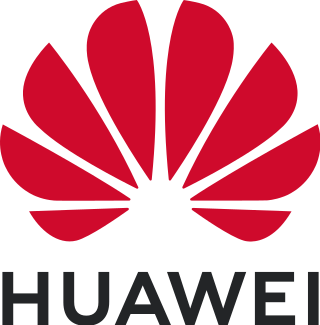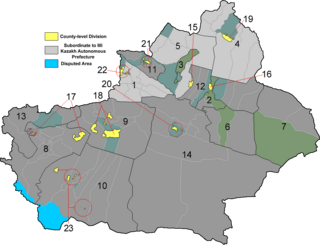
Huawei Technologies Co., Ltd. is a Chinese multinational technology corporation headquartered in Shenzhen, Guangdong. It designs, develops, manufactures and sells telecommunications equipment, consumer electronics, smart devices and various rooftop solar products. The corporation was founded in 1987 by Ren Zhengfei, a former officer in the People's Liberation Army (PLA).

The Xinjiang Production and Construction Corps (XPCC), also known as Bingtuan, trading as the external name China Xinjian Group, is a state-owned enterprise and paramilitary organization in China's Xinjiang Uyghur Autonomous Region (XUAR).
IndigoVision is an IP video surveillance systems company based in Edinburgh, Scotland, founded in 1994.
iFlytek, styled as iFLYTEK, is a partially state-owned Chinese information technology company established in 1999. It creates voice recognition software and 10+ voice-based internet/mobile products covering education, communication, music, intelligent toys industries. State-owned enterprise China Mobile is the company's largest shareholder. The company is listed in the Shenzhen Stock Exchange with market capitalization at 25 billion RMB and it is backed by several state-owned investment funds.

Hangzhou Hikvision Digital Technology Co., Ltd., often shortened to Hikvision, is a Chinese state-owned manufacturer and supplier of video surveillance equipment for civilian and military purposes, headquartered in Hangzhou, Zhejiang. Due to its involvement in mass surveillance of Uyghurs, the Xinjiang internment camps, and national security concerns, the company has been placed under sanctions from the U.S. and European governments.

Mass surveillance in the People's Republic of China (PRC) is the network of monitoring systems used by the Chinese central government to monitor Chinese citizens. It is primarily conducted through the government, although corporate surveillance in connection with the Chinese government has been reported to occur. China monitors its citizens through Internet surveillance, camera surveillance, and through other digital technologies. It has become increasingly widespread and grown in sophistication under General Secretary of the Chinese Communist Party (CCP) Xi Jinping's administration.

Zhejiang Dahua Technology Co., Ltd. is a publicly traded company based in Binjiang District, Hangzhou, which manufactures video surveillance equipment. A minority of Dahua is state-owned.
There have been campaigns advocating for a boycott of products made in China. Commonly cited reasons for boycotting China include the alleged low quality of products, human rights issues, territorial conflicts involving China, support for separatist movements within China, and objection to more specific matters relating to China, including the government's mismanagement of the COVID-19 pandemic.

China Electronics Technology Group Corporation is a Chinese state-owned company established in 2002. Its fields include communications equipment, computers, electronic equipment, IT infrastructure, networks, software development, research services, investment and asset management for civilian and military applications. It was founded with the stated goal of leveraging civilian electronics for the benefit of the People's Liberation Army.
CloudWalk Technology Co. Ltd. is a Chinese developer of facial recognition software.

SenseTime (商汤科技) is a partly state-owned publicly traded artificial intelligence company headquartered in Hong Kong. The company develops technologies including facial recognition, image recognition, object detection, optical character recognition, medical image analysis, video analysis, autonomous driving, and remote sensing. Since 2019, SenseTime has been repeatedly sanctioned by the U.S. government due to allegations that its facial recognition technology has been deployed in the surveillance and internment of the Uyghurs and other ethnic and religious minorities. SenseTime denies the allegations.

The Xinjiang internment camps, officially called vocational education and training centers by the government of China, are internment camps operated by the government of Xinjiang and the Chinese Communist Party Provincial Standing Committee. Human Rights Watch says that they have been used to indoctrinate Uyghurs and other Muslims since 2017 as part of a "people's war on terror", a policy announced in 2014. The camps have been criticized by the governments of many countries and human rights organizations for alleged human rights abuses, including mistreatment, rape, and torture, with some of them alleging genocide. Some 40 countries around the world have called on China to respect the human rights of the Uyghur community, including countries such as Canada, Germany, Turkey, Honduras and Japan. The governments of more than 35 countries have expressed support for China's government. Xinjiang internment camps have been described as "the most extreme example of China's inhumane policies against Uighurs".
The Chinese multinational information technology and consumer electronics company Huawei has faced numerous criticisms for various aspects of its operations, particularly in regards to cybersecurity, intellectual property, and human rights violations.

Megvii is a Chinese technology company that designs image recognition and deep-learning software. Based in Beijing, the company develops artificial intelligence (AI) technology for businesses and for the public sector.

The Chinese government is committing a series of ongoing human rights abuses against Uyghurs and other ethnic and religious minorities in Xinjiang that is often characterized as persecution or as genocide. Beginning in 2014, the Chinese government, under the administration of Chinese Communist Party (CCP) General Secretary Xi Jinping, incarcerated more than an estimated one million Turkic Muslims without any legal process in internment camps. Operations from 2016 to 2021 were led by Xinjiang CCP Secretary Chen Quanguo. It is the largest-scale detention of ethnic and religious minorities since World War II. The Chinese government began to wind down the camps in 2019. Amnesty International states that detainees have been increasingly transferred to the formal penal system.

Rushan Abbas is a Uyghur American activist and advocate from the Xinjiang Uyghur Autonomous Region in China. She is the founder and executive director of the nonprofit Campaign for Uyghurs. Abbas became one of the most prominent Uyghur voices in international activism following her sister's detainment by the Chinese government in 2018.
The United States government applies sanctions against certain institutions and key members of the Chinese government and its ruling Chinese Communist Party (CCP), certain companies linked to the People's Liberation Army (PLA), and other affiliates that the US government has accused of aiding in human rights abuses. The US maintained embargoes against China from the inception of the People's Republic of China in 1949 until 1972. An embargo was reimposed by the US following the 1989 Tiananmen Square protests and massacre. From 2020 onward, the US imposed sanctions and visa restrictions against several Chinese government officials and companies, in response to the persecution of Uyghurs in China, human rights abuses in Hong Kong and Tibet, military-civil fusion, support for the Russian invasion of Ukraine, and fentanyl production.
The Entity List is a trade restriction list published by the United States Department of Commerce's Bureau of Industry and Security (BIS), consisting of certain foreign persons, entities, or governments. Entities on the Entity List are subject to U.S. license requirements for the export or transfer of specified items, such as some U.S. technologies. However, U.S. persons or companies are not prohibited from purchasing items from a company on the Entity List. Being included on the Entities List is less severe than being designated a "Denied Person" and more severe than being placed on the Unverified List (UVL).

The Uyghur Tribunal was an independent "people's tribunal" based in the United Kingdom aiming to examine evidence regarding the ongoing human rights abuses against the Uyghur people by the Government of China and to evaluate whether the abuses constitute genocide under the Genocide Convention. The tribunal was chaired by Geoffrey Nice, the lead prosecutor in the trial of Slobodan Milošević, who announced the creation of the tribunal in September 2020.
Yitu Technology, stylized as YITU, is a Shanghai-based artificial intelligence company that develops facial recognition systems. The company was founded in 2012 by Leo Zhu and Lin Chenxi. Yitu's software, branded as Dragonfly Eye, is used by public security bureaus throughout China to identify individuals and vehicles.











